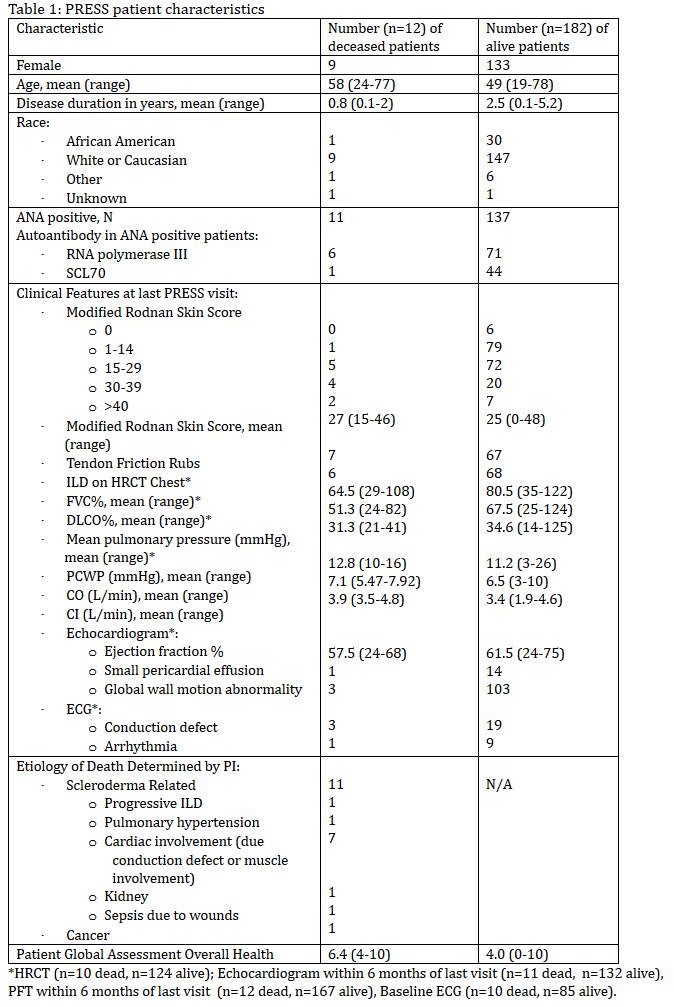Session Information
Date: Tuesday, November 7, 2017
Title: Systemic Sclerosis, Fibrosing Syndromes and Raynaud's – Clinical Aspects and Therapeutics Poster III
Session Type: ACR Poster Session C
Session Time: 9:00AM-11:00AM
Background/Purpose: The Prospective Registry of Early Systemic Sclerosis (PRESS) cohort is an early diffuse cutaneous systemic sclerosis (dcSSc) that provides an opportunity to assess the causes of mortality in this decade. The objective of this analysis was to assess the causes of death and describe the clinical features associated with mortality in the PRESS cohort.
Methods: The PRESS cohort includes dcSSc patients with < 2 years’ duration (from 1st non-RP) who are recruited at 11 U.S. Scleroderma Centers. Patients participate in detailed baseline and biannual clinical and laboratory assessments that permit characterization of patient characteristics and patient-reported clinical outcomes (PRO) measures.
Results: As of May 2017, of 194 patients, 12 have died (6.2%) at median follow-up of 9.6 months (1-20 months). The characteristics of the 12 deceased patients are described in Table 1. In these deceased patients, 6 (50%) had interstitial lung disease (ILD) on a high resolution computed tomography (HRCT) of the chest with abnormal pulmonary function tests (PFT) [mean FVC% 52.4 (range 29-77); DLCO% 51.3 (24-82)]. Ten of the deceased patients had a baseline ECG at enrollment, and 40% had either arrhythmia or conduction block. Echocardiogram in 11 of the deceased population had a mean ejection fraction of below or at the lower limit of normal 57.5% (24-68%). Almost all patients who had a right heart catheterization (RHC, n=5) had an abnormality of either pulmonary hypertension or an elevated pulmonary capillary wedge pressure. The etiology of death was attributed to SSc in 11 of the patients (64% cardio-pulmonary) and esophageal cancer in one of the patients. The mean Patient Global Assessment for Overall Health was 6.4 (4-10), but extensive PRO was not complete at the last PRESS visit in the deceased patients.
Conclusion: In this early dcSSc cohort, we found a 6.2% mortality at median follow up 9.6 months. When compared to data from a single U.S. cohort (Steen and Medsger 1997-2001), cardio-pulmonary involvement continues to be leading cause of mortality in dcSSc. This underscores the importance of screening dcSSc patients with PFT, echocardiogram, and ECG, and confirmatory testing with HRCT chest and RHC. While PRO is an important component of research, the burden of questionnaire-based assessments on patients with significant disease features needs to be better clarified.
To cite this abstract in AMA style:
Frech TM, Assassi S, Bernstein EJ, Castelino FV, Domsic RT, Gordon JK, Hant F, Hinchcliff M, LaSalle B, Shanmugam VK, Steen VD, Khanna D. Mortality in an Early Diffuse Cutaneous Systemic Sclerosis Cohort—Data from the Prospective Registry for Early Systemic Sclerosis [abstract]. Arthritis Rheumatol. 2017; 69 (suppl 10). https://acrabstracts.org/abstract/mortality-in-an-early-diffuse-cutaneous-systemic-sclerosis-cohort-data-from-the-prospective-registry-for-early-systemic-sclerosis/. Accessed .« Back to 2017 ACR/ARHP Annual Meeting
ACR Meeting Abstracts - https://acrabstracts.org/abstract/mortality-in-an-early-diffuse-cutaneous-systemic-sclerosis-cohort-data-from-the-prospective-registry-for-early-systemic-sclerosis/

